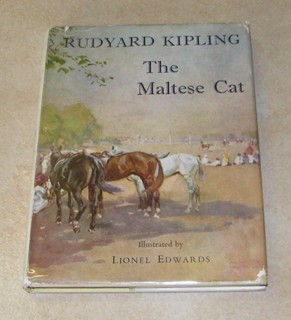Why The Maltese Cat?
- Uploaded by The Maltese Cat
- Published in Educational, Instructional, Informative
- Hits: 29899
- Print,
The “Maltese Cat”, written by Rudyard Kipling, describes a polo game in India in the 19th century. The Maltese Cat is a horse of common breeding, having once pulled a cart in Malta. However, the “Cat” is a student of the game. Against formidable odds and oppponents of high pedigree, the Cat analysizes the game and comes up with a plan. Mounted on the Maltese Cat, the polo player Lutyens knows where quality is to be found.
The Maltese Cat had put his nose into the front of Lutyens’ shirt and was trying to say how sorry he was.
“He knows,” said Lutyens, proudly. “The beggar knows. I’ve played him without a bridle before now – for fun.”
“It’s no fun now,” said Powell. “But we haven’t a decent substitute.”
“No,” said Lutyens. “It’s the last quarter, and we’ve got to make our goal and win. I’ll trust The Cat.”
“If you fall this time, you’ll suffer a little,” said Macnamara.
“I’ll trust The Cat,” said Lutyens.
* * * *
Inspirational speaker Jim Rohn said, “Some teachers teach for others to learn. Some teachers teach for others to use.” I hope that the information written here will be just that…information that you can use.
I like to keep an open mind. You never know when someone may come by and drop in a good idea.
My Non de Plume and stories are dedicated to the principles of the Maltese Cat, a polo pony who did not come with all the advantages of the well bred, but works hard at the game, thinks about it, and shares his knowledge with others for free, soley for the love of the sport. The content is for the student of the game, regardless how experienced you are. If you are open to new ideas, searching for new ways, perhaps you will find some answers here. If not, keep searching, and share that knowledge with others. As UCLA basketball coach John Wooden said,
“It’s what you learn after you know it all that counts.”
Jim Rohn recalls: There were two great orators of antiguity. One was named Cicero. The other was named Demosthenes. Cicero was Roman. Demosthenes was Greek. It is said that when Cicero spoke, the masses were awed and would exclaim,”What a brilliant speech!”
When Demosthenes spoke, the people would say, “Let us march!”
I hope that while you are reading this site you will suddendly stop and say, “Let us play!”
* * * *

